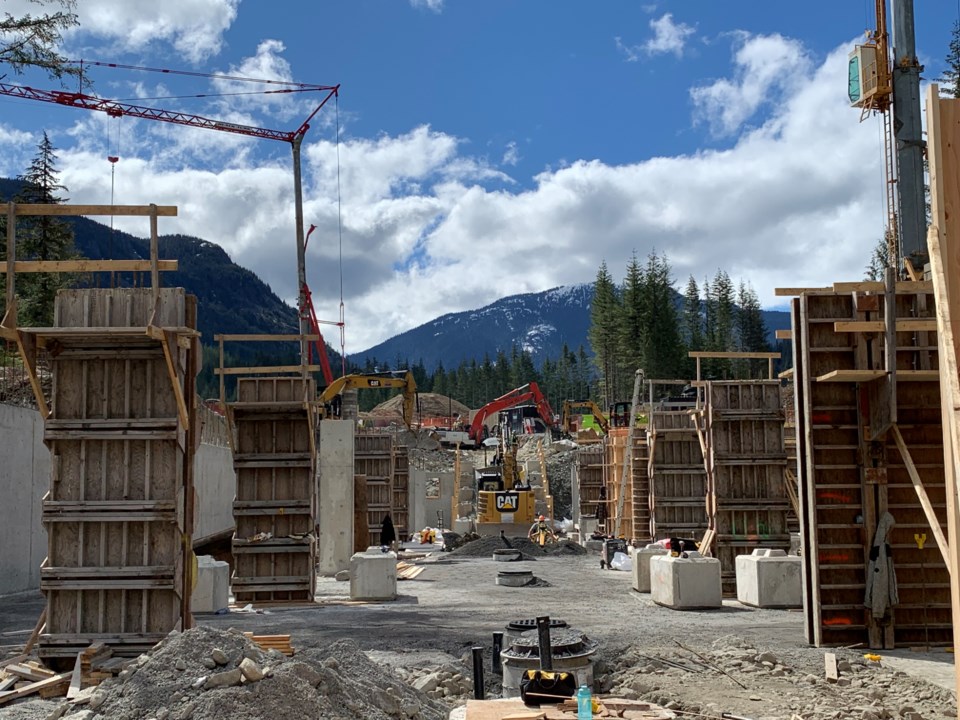The Resort Municipality of Whistler (RMOW) this week unveiled its new Housing Action Plan, offering a comprehensive roadmap towards addressing the community’s longest-running challenge in both the immediate and long term.
At the regular meeting of council on Tuesday, May 16, the public got its first glimpse at the wide-ranging plan, which identifies actions the RMOW intends to take in 2023 to support employee housing, along with completed and ongoing efforts, as well as providing a framework to guide future initiatives beyond this year.
It is, arguably, the most significant and extensive housing strategy the municipality has produced since at least 2016, when the Mayor’s Task Force on Resident Housing was formed, and is broken into six core efforts: monitor supply and identify needs; protect and optimize employee housing; leverage municipal lands; utilize and expand financing tools; encourage the private sector; and remove red-tape barriers.
“I think we’re doing real work here,” said Councillor and Whistler Housing Authority (WHA) chair Jen Ford at the meeting. “Not one of these solutions is easy or cheap or fast, but the combination of all these things, I think, shows our commitment.”
The municipality intends to update the Housing Action Plan annually, beginning in 2024.
Monitor supply and identify needs
Addressing a problem means understanding it, and the RMOW has identified the need to deepen the scope of data it collects on Whistler’s housing market.
On top of the insights it has already gained from a 2021 housing needs report and a provincially mandated housing needs assessment that took place last year, the RMOW plans to complete a Vulnerable Populations Housing Needs Assessment in 2023, as well as develop its first-ever long-term housing strategy, which aims to provide “an estimate of the current employee shortfall, project long-term housing needs by population segments, and identify steps to meet those housing needs,” explained planner Joanna Rees.
Protect and optimize existing employee housing
Making better use of Whistler’s existing inventory has long been discussed as a key component to mitigating the community’s housing woes.
One way the RMOW intends to do that moving forward is by incentivizing the rental of available rooms in employee owner-occupied WHA homes and employee-restricted suites by providing an easy reference for property owners to better understand what the allowable rental rates are under their covenant. Existing rental rates could also be evaluated to incentivize increased utilization.
The RMOW said there is opportunity to further identify differences in unit values to understand the potential impacts on retirees looking to downsize.
On a similar note, staff intend to update the RMOW’s existing seniors housing policy to “address aging-in-place features for seniors housing units and explore models to facilitate independent living and supportive housing.”
Leverage municipal lands
In a town that can’t build fast enough, the RMOW wants to expedite the completion of its Cheakamus Crossing Phase 2 projects by 2026, which, at buildout, will represent 554 new employee bed units—on top of the 596 bed units developed in the past five years.
Exploring public-private housing partnerships is another measure the RMOW is looking at to add housing on municipal land, envisioned as a way to expand financing options and for local businesses to house their staff securely.
Utilize and expand financing tools
In what would represent a tidal shift in how Whistler applies the Municipal and Regional District Tax, the Housing Action Plan recommends allocating a portion of the up-to-three-per-cent tax on short-term accommodation to support affordable housing initiatives.
Introduced in 1987, the tax has historically been used to fund tourism-based marketing and programs.
Whistler council has also directed staff to review the existing cash-in-lieu process it has in place for owners wanting to discharge their mandatory employee restricted suite covenants, recognizing the opportunity to provide “financing to develop new employee housing units, increasing utilization and reducing enforcement challenges,” the RMOW said.
Encourage the private sector
On tap for 2023, the municipality plans to complete the processing of seven private-sector housing applications, which would at buildout contribute another 537 employee bed units. The largest of those projects is Whistler Blackcomb’s Glacier 8 building, a six-storey, 66-unit apartment slated for Blackcomb Base II.
Among the most significant initiatives floated in the housing strategy is a recommendation to develop a new infill housing program. The RMOW’s previous infill program was a pilot project in the Alpine South neighbourhood, which saw little uptake after it was introduced in 2011, partly because of the covenant restrictions on the price units could be sold for.
“The way we’re looking at it is to offer choice to homeowners and expand the range of opportunities, and hopefully there will be uptake,” said planning director Mike Kirkegaard. “We know businesses have interest in properties. We know that homeowners, under certain circumstances, would be interested in a second suite or a subdivision of their suite, so that’s what we’re looking to expand.”
The RMOW is considering several measures as part of the new infill program, including expanding the areas where duplexes are permitted; allowing up to two suites for detached dwellings; and facilitating lot splits for large, detached dwelling lots.
Another future consideration at municipal hall is the possibility of providing bonus density to incentivize the development of employee housing, which would offer more certainty to developers and cut back on application processing times and costs.
Remove red-tape barriers
A persistent headache for builders in Whistler is the relatively long time it can take to process crucial building and development permits.
As a means to improve those wait times, the RMOW this year intends to lobby the province on re-introducing employee-restricted properties in the Provincial Property Tax Deferment Program, which provides low-interest loans to eligible B.C. homeowners.
The municipality said it would also prioritize the expediting of employee housing building permits in 2023.
Pique will have more on the specific initiatives laid out in the Housing Action Plan in the coming weeks.




.jpg;w=120;h=80;mode=crop)